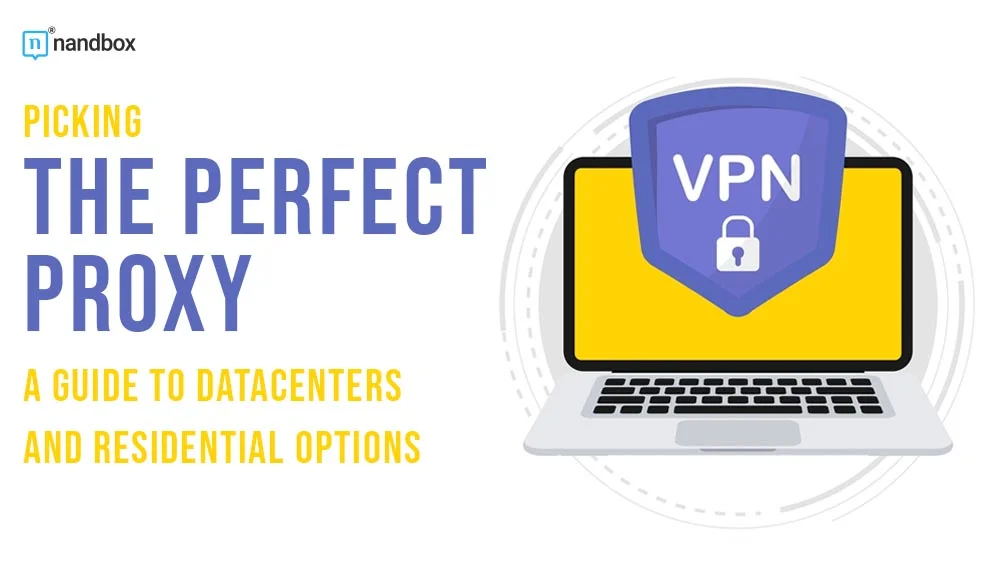Picking the Perfect Proxy: Datacenter vs. Residential Proxies
The two most common types of proxies are datacenter and residential proxies. One type champions bandwidth reliability and cost efficiency, while the other provides anonymity and greater research functionality. In this article, we define which is which, datacenter vs. residential proxies, helping you understand what choice to make in case you choose to buy one.
What are Proxies
In the context of online privacy, proxies are a tool for partially concealing your online activities. From a technical standpoint, proxies are intermediary servers that stand between your device and the internet, providing an alternative path for your data to travel.
When you enter a website, open an online service, or simply click a button, your action generates internet traffic that carries an identification number, called IP address, to discern your device from the rest.
Using a proxy means sending your internet traffic through an alternative path that conceals your IP address, using one allocated to the respective proxy server. This obfuscation offers various benefits, from different levels of anonymity and access to geo-restricted content.
Datacenter vs. Residential Proxies
Now that we’ve established proxies as your online cloak, let’s delve into the two main types: datacenter proxies and residential proxies. These categories offer varying levels of stealth and utility, so choosing the right one depends on your end goal.
On the one hand, we have datacenter proxies. These are proxy servers that are housed within large data centers that are equipped with a powerful network infrastructure. Data centers maintain vast numbers of IP addresses not affiliated with Internet Service Providers (ISPs).
Strong infrastructure combined with data center-sourced IP addresses gives datacenter proxies their unique traits:
Superior Speed: Because they reside in high-powered facilities, datacenter proxies deliver exceptional connection speeds, making them particularly well-suited for tasks involving the transfer of substantial data volumes.
Cost-Effective: Establishing and maintaining a server farm is demonstrably less expensive than recruiting a vast number of individual internet users. Consequently, data center proxies are typically more economical.
Reduced Covertness: A significant drawback associated with datacenter proxies is their susceptibility to detection by websites. This vulnerability stems from the fact that data center IP addresses often belong to a concentrated range owned by the data center, potentially triggering security measures of online services that may flag or block your activity.
On the other hand, we have residential proxies. Residential proxies function in a manner analogous to borrowing your neighbor’s internet connection, naturally, with their prior consent.
Residential proxies originate from actual devices such as desktops, laptops, and smartphones situated within homes across the globe. There are several subtypes of residential proxies; two of them include the static residential proxy and rotating residential proxy types.
The latter automatically changes the IP address at regular intervals, which can be particularly useful for tasks requiring high anonymity over extended periods. The implications of residential proxies for the user are as follows:
- Unparalleled Anonymity: Since the IP addresses associated with residential proxies belong to individual users, they closely resemble standard internet traffic, making them ideal for scenarios requiring the highest level of anonymity.
- Geographic Specificity: Residential proxies provide access to a vast pool of IP addresses from a multitude of countries. This empowers users to circumvent geographical restrictions and access content that may otherwise be unavailable.
- Reduced Speed & Increased Cost: Sharing bandwidth with other users can lead to diminished connection speeds. Additionally, the logistical challenges associated with managing a network of individual devices make residential proxies a more expensive option compared to their datacenter counterparts.
How to Choose the Right Proxy Type
Having explored the strengths and weaknesses of datacenter and residential proxies, the critical question remains: which one suits you best? The answer hinges on a simple trade-off: speed and affordability versus anonymity and location targeting
Datacenter Proxies: Speed and Efficiency for Public Tasks
- Web Scraping: Datacenter proxies excel at rapidly collecting large amounts of public data from websites. Their speed and affordability make them ideal for tasks where anonymity isn’t paramount.
- Content Testing: Websites can use datacenter proxies to perform load testing or simulate user traffic from different locations to assess global performance.
Residential Proxies: Anonymity and Location Specificity for Private Tasks
- Market Research: Businesses can use residential proxies to access geo-restricted market research data or analyze competitor pricing strategies in specific regions.
- Avoiding CAPTCHAs: High proxy traffic can trigger CAPTCHAs (those “I’m not a robot” tests). Residential proxies can help users avoid getting flagged as bots, ensuring a smoother browsing experience.
- Social Media Management: Marketers can leverage residential proxies to manage multiple social media accounts efficiently. This can be useful for scheduling posts or monitoring competitor activity across various regions (if the datacenter offers IPs from different locations).
Summary
In conclusion, selecting the most suitable proxy depends on your specific needs. Datacenter proxies prioritize speed and affordability, making them well-suited for public tasks like web scraping, social media management, and content testing.
Conversely, residential proxies excel in anonymity and location targeting, catering to private endeavors like market research, evading CAPTCHAs, and enhancing privacy while browsing or accessing geo-restricted content.





![Read more about the article How to Update Your Phone Number in nandbox Messenger [Tutorial]](https://nandbox.com/wp-content/uploads/2018/06/Introducing-nandbox-Messenger-300x169.webp)
